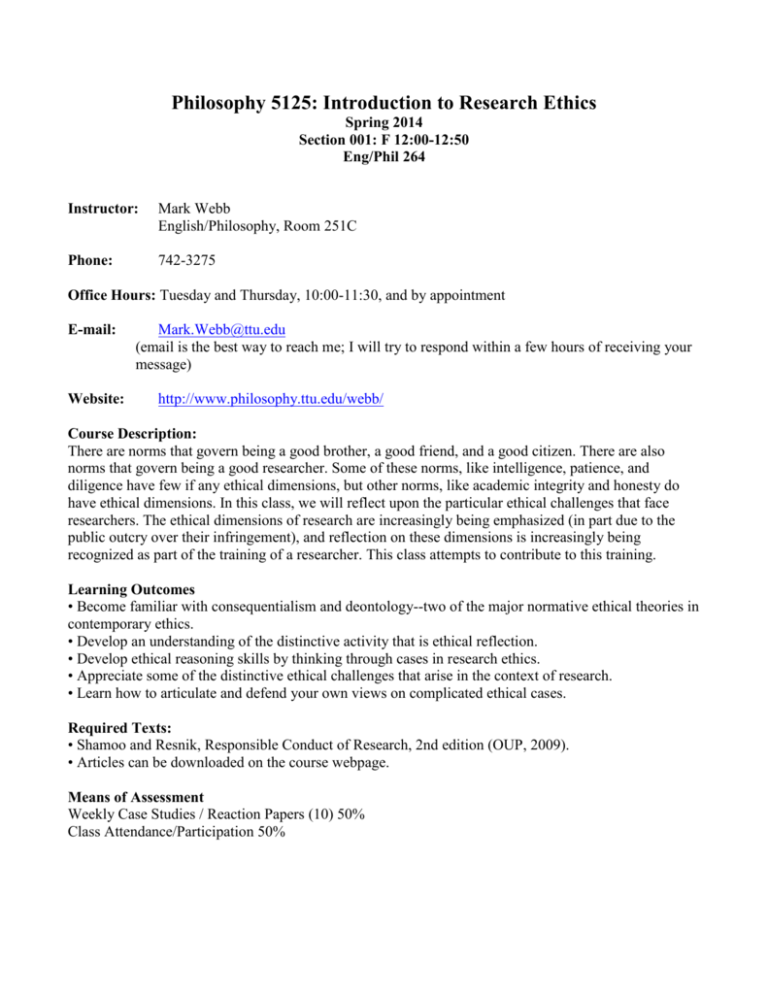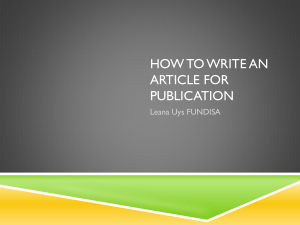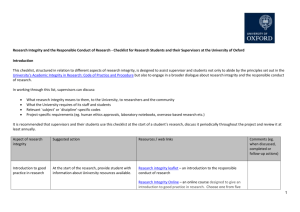Philosophy 5125: Introduction to Research Ethics
advertisement

Philosophy 5125: Introduction to Research Ethics Spring 2014 Section 001: F 12:00-12:50 Eng/Phil 264 Instructor: Mark Webb English/Philosophy, Room 251C Phone: 742-3275 Office Hours: Tuesday and Thursday, 10:00-11:30, and by appointment E-mail: Website: Mark.Webb@ttu.edu (email is the best way to reach me; I will try to respond within a few hours of receiving your message) http://www.philosophy.ttu.edu/webb/ Course Description: There are norms that govern being a good brother, a good friend, and a good citizen. There are also norms that govern being a good researcher. Some of these norms, like intelligence, patience, and diligence have few if any ethical dimensions, but other norms, like academic integrity and honesty do have ethical dimensions. In this class, we will reflect upon the particular ethical challenges that face researchers. The ethical dimensions of research are increasingly being emphasized (in part due to the public outcry over their infringement), and reflection on these dimensions is increasingly being recognized as part of the training of a researcher. This class attempts to contribute to this training. Learning Outcomes • Become familiar with consequentialism and deontology--two of the major normative ethical theories in contemporary ethics. • Develop an understanding of the distinctive activity that is ethical reflection. • Develop ethical reasoning skills by thinking through cases in research ethics. • Appreciate some of the distinctive ethical challenges that arise in the context of research. • Learn how to articulate and defend your own views on complicated ethical cases. Required Texts: • Shamoo and Resnik, Responsible Conduct of Research, 2nd edition (OUP, 2009). • Articles can be downloaded on the course webpage. Means of Assessment Weekly Case Studies / Reaction Papers (10) 50% Class Attendance/Participation 50% There are 13 classes and 12 weekly assignments. Each class attended or assignment satisfactorily completed is worth 1 point. There is, therefore, a total of 25 points in this class. Grades are assigned as follows: Grade A AB+ B Pts [22-25] [21-22) [20-21) [18-20) Grade BC+ C C- Pts [17-18) [16-17) [14-16) [13-14) Grade D+ D F Pts [12-13) [10-12) [0-10) Requirements: Towards the end of many of the readings in the text, you will find a number of case studies. Each week you are required to pick one of these case studies and briefly reflect on the case. Try to say something about it that is not obvious and only came to you through careful thought. For weeks in which there are no case studies, you must write a 5 – 10 sentence summary of the reading. There are 12 of these assignments. Students With Disabilities Any student who, because of a disabling condition, may require some special arrangements in order to meet course requirements should contact me as soon as possible so that the necessary accommodations can be made. Students should present appropriate verification from AccessTECH in the Student Counseling Center in West Hall. To preserve confidentiality, you may ask to speak to me in private, or notify me by email. Academic Integrity I make it a general policy to refer all such cases to the Dean’s office with a recommendation for the fullest sanctions, as well as automatic failure for the course. Please familiarize yourself with TTU’s statement on academic integrity and come speak with me if you have any questions: http://www.depts.ttu.edu/studentjudicialprograms/academicinteg.php# Schedule of Readings Week Date Topic I 1/24 Intro II 2/7 What is Ethics III 2/14 Utilitarianism IV 2/21 Deontology V 2/28 VI 3/7 VII 3/14 VIII 3/28 The Role of Science in Society Misconduct in Research Data Acquisition and Management Collaboration IX 4/4 X 4/11 XI 4/18 XII 4/25 XIII 5/2 Conflicts of Interest Mentoring and Collaboration Authorship Publication and Peer Review Intellectual Property Readings Shamoo and Resnik: p. 3- 38 Assignment Reading Summary Shafer Landau : “Consequentialism: Its Nature and Reading Attractions,” Summary Shafer Landau: “The Kantian Perspective: Fairness Reading and Justice,” and “The Kantian Perspective: Summary Autonomy and Respect,” Excerpt from Towards a Natural Science, Leon Reading Kass Summary Shamoo and Resnik: p: 140-166 Case Analysis S &R: 39-67 Case Analysis S & R: 81- 97 Case Analysis S & R: 189- 214 Case Analysis S & R: 68-80; Macrina, “Collaborative Research,” Case Analysis Fine and Kurdek, “Reflections on Determining Case Authorship Credit and Authorship Order on Analysis Faculty-Student Collaborations,” S & R: 110-139 Case Analysis S & R: 167-188; Hick, “Finding a Foundation: Case Copyrightand the Creative Act,” Texas Intellectual Analysis Property Journal, 17 (2009), pp. 263-283.










